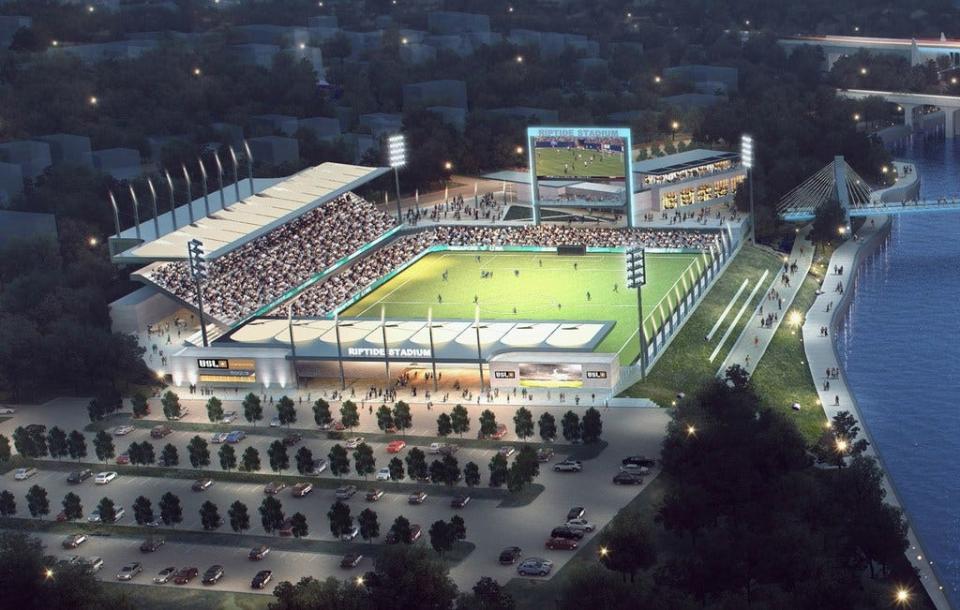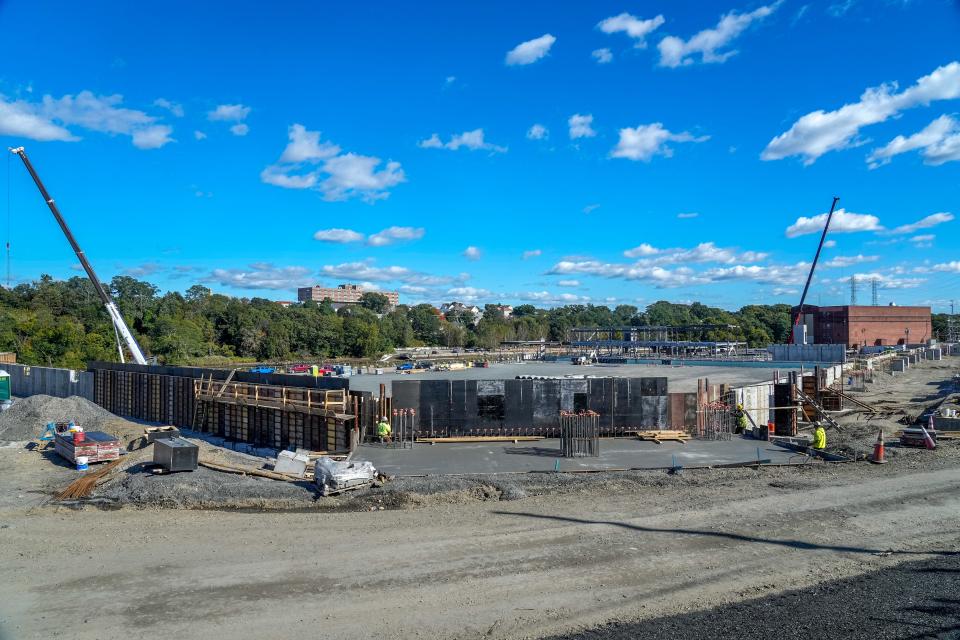RI will ultimately pay $132M to build a Pawtucket soccer stadium. Why is it so expensive?
The Tidewater Landing stadium in Pawtucket is on track to open early next year and, when it does, the 10,500-seat building is expected to be the most expensive minor league soccer stadium in the country.
That's not a shock given the spiraling cost of construction, but even the state economic development officials who signed off on the project didn't know how steeply the price of publicly financing the stadium would climb.
To channel $27 million to stadium developer Fortuitous Partners, Pawtucket earlier this month sold a $54.3-million tax-free bond. Under the terms of the bond, the state is projected to pay $132 million in total debt service over the next 30 years.
Those borrowing costs – which Bloomberg's municipal bond reporter compared to the price of government debt in Pakistan – have triggered sticker shock in some quarters.
"My concern is how this got to be so expensive and such an enormous waste of taxpayer money," said Michael McNally, a former member of the state Commerce Corporation Board who voted against the project in 2022.
House Speaker K. Joseph Shekarchi had this to say about the bond sale Tuesday: “Obviously these are not favorable terms, and I expect that the issuer will exercise all available options to reduce future repayment costs.”
But Rhode Island Commerce Secretary Liz Tanner, who has overseen the deal for the state for the last two years, on Monday defended the deal over the long term.
"Stadiums are expensive. We know that they're expensive, and these dollars that we're putting into it are going to have a nice infrastructure project for us when we're done," Tanner told The Journal on Monday. "We know we're going to have a stadium when we're finished, with a soccer team, and that's good for Rhode Island."

How did we get here?
The Tidewater Landing stadium plan first launched in December 2019, with the city still stinging from the loss of the Pawtucket Red Sox Triple-A baseball team.
Initially the Tidewater stadium was supposed to anchor a $400-million development spanning the Seekonk River and Interstate 95, containing hundreds of apartments plus shops, offices, a hotel and an event center.
The state first approved a $50-million public subsidy package for the development in February 2021 after the segment north of I-95 had been eliminated, slimming the project down to 25 acres.
But before work could begin, inflation spiked and the Federal Reserve hiked interest rates, sending the project cost soaring. The stadium is now expected to cost $137 million.

In the summer of 2022, Fortuitous shrank the project again, this time asking for the same public investment, but for the stadium alone. On July 25, 2022, Gov. Dan McKee broke a tie on the Commerce Corporation board to give almost all of the subsidy package to the stadium.
Public funds going to Fortuitous Partners, once they finish the stadium, will include:
$27 million from the bond
$10 million in Pawtucket's federal pandemic aid
$10 million from state tax credits (The state is issuing $14 million in Rebuild RI tax credits to net $10 million)
But the cost of the borrowing keeps going up. When the deal was approved, the state planned to provide Fortuitous $27 million for the stadium from a $37-million bond. By October, with higher interest rates prompting investors to demand ever higher yield, the principal on the bond grew to $54 million, including reserves and administrative costs.
The deal allows the state to make interest-only payments on the bonds for the first 10 years. There's a $5-million reserve in place to make payments in any year the General Assembly decides not to appropriate the required funding. And there is an $11-million "capitalized interest fund" that will fund payments in the early years.
Of the $54-million principal borrowed, $7 million is set aside to pay middlemen, lawyers, consultants and other administrative expenses, according to a breakdown from Commerce RI.
Why didn't the state just pay less two years ago?
Why didn't the state just appropriate $27 million for the stadium two years ago and save the tens of millions required by this exotic financing?
"When this project started a couple of years ago, this was the deal that was made, as far as how it was going to unfold, and all of those conversations were based on far lower interest rates," Tanner said. "The $27 million, if it had been done upfront, would have had to have been General Assembly-approved."
More: Soccer stadium bond adviser cited 'concerns' about project before quitting. What we know.
Since authorizing this type of state financing for a proposed new PawSox ballpark that never came to pass, legislative leaders have been cool to the idea of a direct investment into the soccer stadium.
Why not change the deal as economic conditions changed over the years?
"So we had committed to a deal at that point and we were in a contractual relationship to commit to following through with what we had done," Tanner said. "And if you had changed the course of the transaction, there would've been a level of uncertainty without knowing whether the legislature was going to pass those dollars or not. So we continued on the path that we had set up originally."

Although the Pawtucket Redevelopment Agency issued the stadium bonds, they are to be repaid with state tax revenue generated in Pawtucket, supplemented if necessary by appropriations from the Assembly.
Because of the money set aside, state lawmakers won't have to appropriate any money for the stadium until 2027.
Tanner said if interest rates rise again, the 8.24% rate the state is paying will end up looking like a bargain. If they fall, the rate will look worse, but the state will be able refinance after 10 years at a lower rate.
Is this 38 Studios all over again?
The complicated financing structure of the stadium bonds recall the $75-million 38 Studios deal.
Unlike the 38 Studios bonds, which were supposed to "pay for themselves" through revenue from the company that ended up folding, the stadium bonds are intended to be repaid by state tax dollars.
The risk to the state lies in what would happen if Rhode Island FC, the team slated to play in the stadium, folds, something not uncommon in professional soccer.
As it awaits the construction of the soccer stadium, Pawtucket is planning to tear down McCoy Stadium, which assumed negative value when the PawSox left.
More: Pawtucket soccer stadium's financing is complete. Here's what's behind the $137M project
"[Rhode Island FC] did commit to a 30-year relationship with us," Tanner said. "If they don't, there's liquidated damages that they would have to pay."
Asked what those damages would be worth if the team goes bankrupt, Tanner said the state would get the stadium as an asset.
What would the empty stadium be worth?
"Again, we're doing speculation on so many ifs," she said.
To encourage Fortuitous to finish the residential and commercial development that initially attracted the state to the project, Commerce RI is providing the developer $1.5 million to start working on that next phase.
There is still no timeline on when any plans for stadium-adjacent development will be drawn up or cost estimates formulated.
Tanner said, if anything, she is "far more optimistic" about the residential/commercial development happening "because they have their investors all gathered to work on the stadium project and so we know there's more people who have already committed the stadium that could be potentially partnering with them."
This article originally appeared on The Providence Journal: Tidewater Landing soccer stadium will cost RI over $100 million. How?

